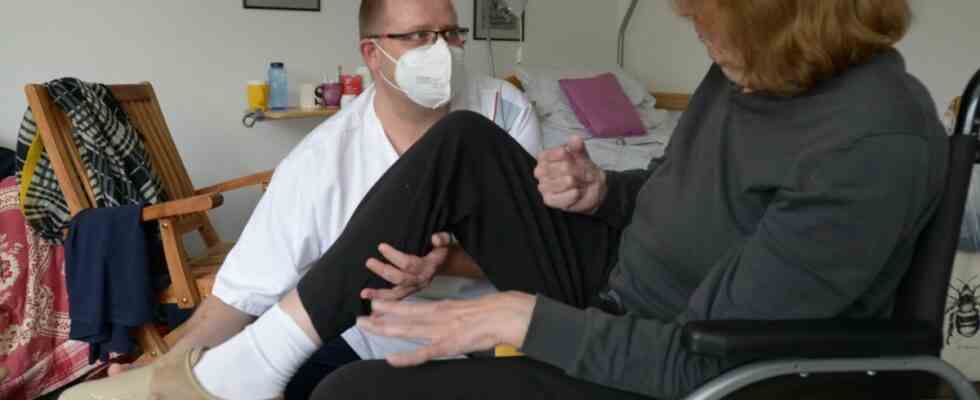Tobias Kemter takes a short break from smoking. Lunch is coming soon at his station. The geriatric nurse doesn’t have much time for banter: Since the corona pandemic, his working day has been even fuller. “It has become more,” explains Kemter. In addition to the usual tasks such as bureaucracy and care for the residents, new tasks have been added in recent months, such as corona tests. “From a nursing point of view, it’s more work. I often don’t have the time for other things that I need more time for,” says the nurse. Since the pandemic, he has had to do more work in the same amount of time. This leaves fewer opportunities for conversations with individual residents. “We’re definitely drained.”
The 38-year-old has been working in the industry for 20 years. Tobias Kemter now heads a station at the Awo Horst Salzmann Center in Neuperlach. Despite the heavy workload, giving up is not an option for him. “We’re definitely exhausted, but we’re still fighting,” says Kemter. He himself has experienced many departures from colleagues. “It’s still an affair of the heart for me. I’ll stick with it as long as I can do it physically and mentally.” But the past few months have taken a toll on him. It was also a difficult time for the residents, explains Kemter. “The mental work was significantly higher.”
Tobias Kemter, here with resident Sylvia Kohlstadt, not only has to take care of the physical needs of the people he cares for. In addition, there are more and more bureaucratic tasks that rob him of the time for his actual work.
(Photo: Robert Haas)
Tobias Kemter believes that the biggest problem at the moment is the nursing key, i.e. the relationship between nurses and patients. He notices this especially with bureaucratic tasks. These include, for example, care planning, screenings and the recording of corona tests. “It’s sometimes difficult because the people just aren’t there.” Things got really tight in February: almost 80 percent of the staff had to stay at home because of a corona infection, says Kemter. A solution to the staff shortage can only be found at the political level. “If the maintenance code is not adjusted, nothing will change,” Kemter is convinced.
The nurse isn’t interested in more money, but in better working conditions: “Sure, money is always nice, but what good is the money if my body is broken.” But the attractiveness of the nursing professions is also a challenge. The station manager sees the public as responsible for this. The assessment of the job profile must turn positive. But here the nurse is at a loss. “I don’t know how,” says Kemter.
Under the motto “Providing care is ADDED value!” the Munich welfare associations are therefore now starting an annual campaign. “We have to increase long-term care,” says Hans Kopp, managing director of the Munich workers’ welfare organization. “It can not go on like this.” Kopp says, “as social organizations, we see it as our duty to politicians to demand legal foundations for better care.” But society must finally pay “the appropriate attention” to care.
After all, demand will “grow exorbitantly,” explains Marion Ivakko, deputy director of the Munich district association at the Bavarian Red Cross. In order to attract more people to the nursing profession, the appreciation for nursing must increase, this is the first of eleven demands that are to be presented one after the other over a period of one year.
The workers’ welfare in Augsburg has already achieved a 35-hour week
At a press conference by the social associations, Ivakko spoke out in favor of questioning the weekly working hours in care – previously 38.5 to 40 hours – especially since the profession is not only mentally and emotionally demanding, but also physically demanding. Dirk Spohd, managing director of the help in old age, which belongs to Diakonie, finds the 35-hour week “very worth discussing”. The model is the reduction of working hours to 35 hours with full wage compensation, as recently agreed in two steps by September 2023 in the wage agreement for nursing staff at Arbeiterwohlfahrt Augsburg with the Verdi union. However, the resulting additional costs should not be passed on to the person to be cared for and their relatives.
The Augsburg workers’ welfare organization found it easier to negotiate the reduction in working hours, says Kopp, because the collective agreement for the Bavarian workers’ welfare organization does not apply to them, but rather their own in-house collective agreement. In order to implement a 35-hour week for all areas of care with full wage and inflation compensation, ten billion euros a year are needed nationwide for compensation. In view of the additional costs, Kopp called for comprehensive long-term care insurance based on solidarity.
“Added value cannot be created solely on the backs of those in need of care,” confirms Grit Schneider, Deputy Managing Director of the Upper Bavaria District Association of the Parity Welfare Association. “We need to end the risk of poverty in care.” In the homes, a third of the residents depend on social assistance, “the nursing care insurance does not meet today’s requirements”. Doris Schneider, manager of the Caritas old people’s homes, emphasizes that “we need more heads and more hands to be able to do the work we envision”. The working conditions, which suffer from bureaucratic requirements and constantly changing regulations, are also decisive.

